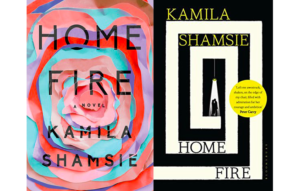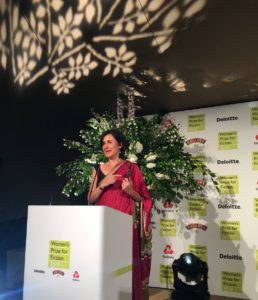Interview: Kamila Shamsie on her Bold and Heart-Breaking New Novel, “Home Fire”
 My interview with Man Booker Prize 2017 longlisted writer Kamila Shamsie has been published in Bookwitty on 29 August 2017. Here is
My interview with Man Booker Prize 2017 longlisted writer Kamila Shamsie has been published in Bookwitty on 29 August 2017. Here is
Kamila Shamsie’s latest novel Home Fire was longlisted for the Man Booker Prize 2017 within days of its release. Home Fire explores the complicated relationship Isma has with her younger twin siblings, Aneeka and Parvaiz. It is also a modern retelling of Antigone in which Isma, whose mother has died, works hard to raise her brother and sister. When they reach adulthood, Isma leaves for the US to study at university while her brother, Parvaiz, who has unfortunately become radicalised in Britain, leaves to join ISIS, following in the footsteps of their jihadist father. Aneeka, meanwhile, is torn between her love for her older sister and her twin. The idea of two sisters where one is conventional, bordering on timid but keeps the home fire burning while the other leaves home and enters the world of men with far reaching consequences has been encapsulated in myths and legends. There is Antigone and her sister Ismene from the Greek myth, and Mary and Martha in the New Testament. The Sophoclean chorus giving a background and a perspective on the “tricky” position British Muslims occupy is provided by the character of a Muslim MP and Home Secretary, Karamat Lone, and his son, Eamonn.
( Updated: Kamila Shamsie won the Women’s Prize for Fiction 2018 on 6 June 2018. Earlier on 3 May 2018 she wrote for the Guardian on “predicting the rise of Sajid Javid“, the newly appointed British Home Secretary.)
Following, are excerpts of an interview with Kamila Shamsie.
Did you start by wanting to re-work Antigone or was it something about contemporary politics that made you think of Antigone as a channel for your novel? Did you have Sophocles’ Antigone in mind or the Antigone myth in general?
The novel came about because Jatinder Verma, who runs the Tara Arts Theatre in London, suggested that I adapt a play for his theatre. He was the one to suggest that Sophocles’ Antigone might work well within a contemporary context. Once I re-read the play, I quickly knew the way the contemporary world could work with that ancient story, and eventually I also knew that I wanted to write it as a novel, not a play. Jatinder was very nice about it.
The impact of politics on individuals recurs in all your novels. Is it possible to pinpoint what triggered the story of Home Fire?
I started to think about it in 2014. At the time, the Islamic State had recently declared their so-called Caliphate, and you were starting to hear stories of young British men going to Syria to join them. So there was that story. But there was also the story of the British government’s response, which was to want to strip those British men of their citizenship. I was interested in both sides of the story – and of what it meant for the family members whose sons and brothers made these terrible choices.
The distress of the partition of the Indian subcontinent in 1947 and its long-lasting impact on subsequent generations has also recurred in your fiction. Has its power faded or increased for you as a means of understanding contemporary politics?
I suppose it depends which bit of contemporary politics I’m looking at. It wasn’t in any way in my mind when I was writing Home Fire—though I did think about the Empire, and what it meant when the colonizers had to accept the colonized as equal citizens within Britain—have they ever really been able to do it?
Immigrants and race identity are critical to you. You have written about these matters in your non-fiction work. What do you hope the impact will be by writing about them in a novel?
I don’t know that race identity is particularly critical to me, actually. I would say structural imbalances of power interest me; sometimes that takes the form of sexism, sometimes racism, sometimes other forms of discrimination.
I don’t write novels with the hope that they’ll have an impact in ‘real life’, I write them to explore things that are of interest to me. I hope they’ll be of interest to other people. Mostly I hope they’ll work as novels.
Yet another recurrent aspect of your novels is twins. Why do you use twins as a literary device?
Well, it’s been seventeen years since one book with twins, Salt and Saffron, and another, Home Fire, so I’m not sure it’s particularly recurrent. Or perhaps I just see the twins functioning so differently in both books that I don’t find much connection between the two. Salt and Saffron was much lighter in tone; the twins in there were part of mythical, fantastical stories or were involved in stories of mistaken identity etc. With Home Fire I used the twinness of Aneeka and Parvaiz both to create a sense of their extreme closeness and their separateness from their elder sister, Isma.
Where did your research for this book take you? What did you regret not being able to incorporate?
Compared to the last couple of books this one felt quite ‘research lite’—a lot of the contemporary politics was already in my head, and much of the book was set in Massachusetts and London, both places I’ve lived in and know. Though I did do some wandering through the Preston Road neighbourhood of London and spoke to people there to help me create the Pasha family. The section that involved the most research was life in Raqqa under the Islamic State, for which I relied on documentaries, news reports, interviews, illustrations etc. that I found online. The research all followed the needs of the novel, in quite a streamlined way, so I don’t think there was anything I wanted to incorporate and didn’t.
John McCormack’s song, Keep the home fires burning, was hugely popular during World War I, why did you choose as the title Home Fire and not Home Fires for your book?
Fire, not Fires, simply because there was both a TV series and another novel already out there with the name Home Fires. But actually, once I’d decided on ‘Fire’ I realized I preferred it because it moved away from the WWI song, and I didn’t want people assuming it was a First World War novel.
The title plays on the two meanings of Home Fire: it can mean welcome and warmth, as in ‘keep the home fires burning’ or it can mean a house on fire. I wanted both those meanings in there since this is a novel that has within it both intimacy/love and conflagration.
The title plays on the two meanings of Home Fire: it can mean welcome and warmth, as in ‘keep the home fires burning’ or it can mean a house on fire. I wanted both those meanings in there since this is a novel that has within it both intimacy/love and conflagration.
In Home Fire you have once again used multiple first person narrators. Why?
I suppose it goes back to that John Berger line: never again will a single story be told as though it were the only one.
I’ve long been interested in the different way the same moment or person or idea can look to different people. Here we all are, enclosed in our own minds and personalities but also constantly interacting with each other, trying to understand each other. In Home Fire the ways in which people do and don’t know each other is crucial to the novel. Multiple narrators seemed the best way to explore that.
As a writer, do you think of yourself as belonging to a British, Pakistani or even British Muslim Fiction literary tradition? Or is it a bit of all? If you do think of yourself as belonging to any category does it help you create your fiction or not?
As a writer I think of myself as a writer. It’s the work of critics and academics and people who organize their bookshelves by categories to decide what label to affix to me.
30 August 2017

1 Comment